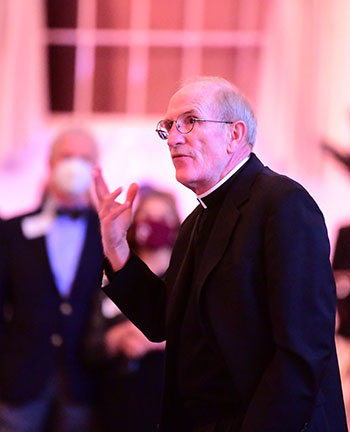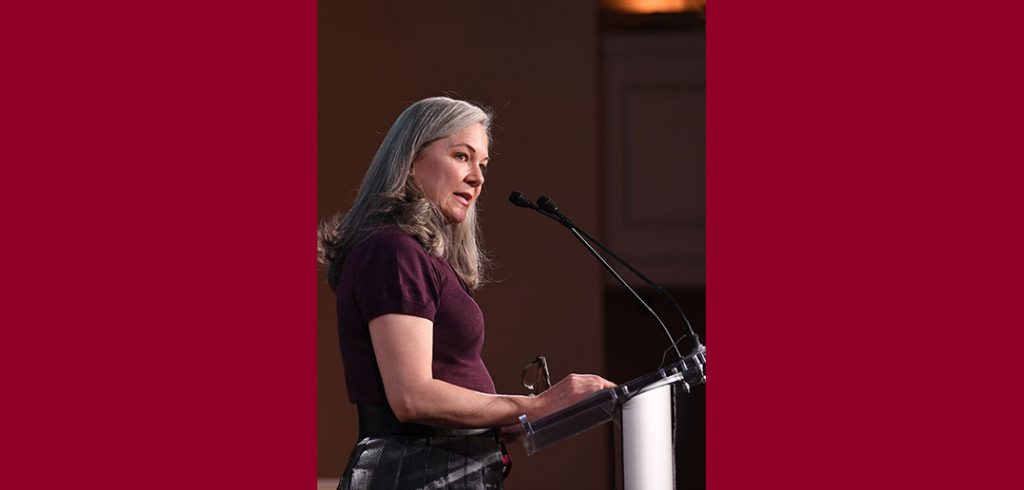The annual event recognizes alumni volunteers and helps further the FUAA’s mission to foster lifelong connections among alumni and promote a sense of general goodwill and support for Fordham worldwide.
Sally Benner, FCRH ’84, chair of the FUAA Advisory Board, introduced new and returning board members, 24 volunteers who represent the University’s 200,000-plus global alumni worldwide. They include graduates from 10 Fordham schools, including Marymount and Thomas More College, and their class years span six decades. Quoting another graduate, Benner said the group aims “to serve as connective tissue—to connect us to each other, to connect you to the University, and to connect the University to you.”
As she spoke about the Fordham community and its commitment to cura personalis, or care for the whole person, Benner noted that the alumni were gathering during a week in which “the world commemorates the birthday of Martin Luther King Jr.”—and less than two weeks after a fire killed 17 people and injured dozens of others in the Tremont neighborhood of the Bronx, a mere 15-minute walk from the Rose Hill campus.
She shared how she is motivated by a quote from King’s 1963 “Letter from Birmingham Jail”: “’We are caught in an inescapable network of mutuality, tied in a single garment of destiny. Whatever affects one directly affects us all indirectly,’” she said, quoting King. “Tonight, I ask our alumni community to consider care for the whole person to include care for our communities.”
Benner encouraged alumni to seek out Julie Gafney, Ph.D., executive director of the University’s Center for Community Engaged Learning, who was in attendance with a list, now posted on the center’s Instagram account, of how victims of the fire felt the Fordham community could offer support.
“If you have the means to share your abundance, by contributing your skills or good fortune to help, you will learn how the largely Gambian community would value it most,” Benner said.
A Legacy of Transformation

This year’s FUAA reception also marked the last one for Joseph M. McShane, S.J., before he steps down as president of Fordham in June. Throughout the evening, on a big screen behind the ballroom stage, the FUAA featured a slideshow highlighting the University’s transformation under his leadership since 2003. Prior to the event, attendees had an opportunity to submit their own personal tributes and memorable McShane moments, which were included in the slideshow.
During his own speech, Father McShane thanked Benner, who stepped into her role as chair just this year, for “organizing us this evening and doing it with her characteristic class.”
He also remarked on the University’s strength as it continues to navigate the pandemic, noting that the Class of 2025 is “the largest, most diverse, and brightest class in Fordham’s 180-year history,” and that 2021 was the “best fundraising year” in the University’s history, thanks to the “extraordinary generosity” of alumni and others who invested more than $84 million in the University and its mission.
“We didn’t just get through,” he said. “Fordham came through with great strength because it was true to its sense of mission, and its mission and its heart is a mission that is based on love and directed toward the cultivation of all the gifts that students have—cura personalis, in other words.”
The FUAA is always looking to connect with new voices from the University’s alumni community. For info on its upcoming events or to learn more, visit Forever Fordham.

